Top Rankings
Pendleton SD 16 School District ranks among the top 20% of public school district in Oregon for:
Category
Attribute
Diversity
Most diverse schools (Top 1%)
For the 2025 school year, there is 1 public preschool serving 228 students in Pendleton SD 16 School District.
Public Preschools in Pendleton SD 16 School District have a diversity score of 0.53, which is less than the Oregon public preschool average of 0.67.
Minority enrollment is 33% of the student body (majority Hispanic), which is less than the Oregon public preschool average of 52% (majority Hispanic).
Overview
This School District
This State (OR)
# Schools
8 Schools
91 Schools
# Students
2,890 Students
29,714 Students
# Teachers
165 Teachers
1,885 Teachers
Student : Teacher Ratio
18:1
18:1
District Rank
Pendleton SD 16 School District, which is ranked within the bottom 50% of all 186 school districts in Oregon (based off of combined math and reading proficiency testing data) for the 2021-2022 school year.
The school district's graduation rate of 82% has decreased from 83% over five school years.
Overall District Rank
#105 out of 189 school districts
(Bottom 50%)
(Bottom 50%)
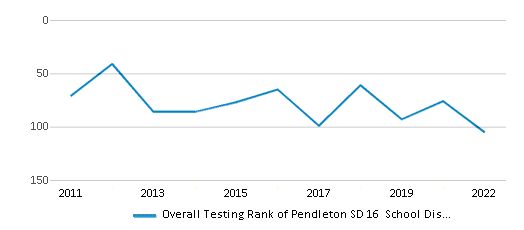
Math Test Scores (% Proficient)
25%
31%
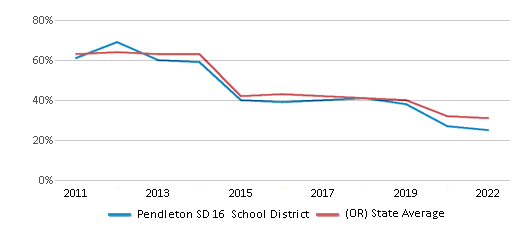
Reading/Language Arts Test Scores (% Proficient)
41%
44%
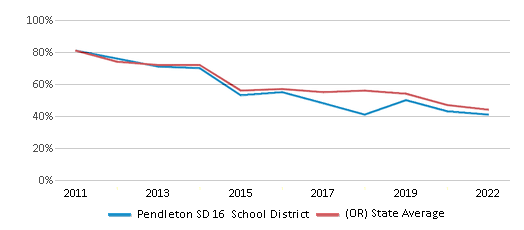
Science Test Scores (% Proficient)
23%
30%
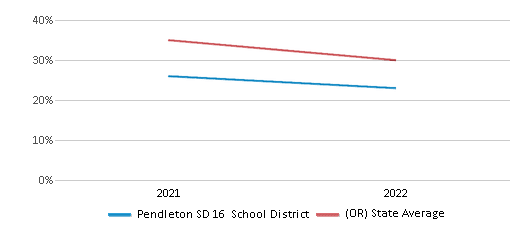
Graduation Rate
82%
81%
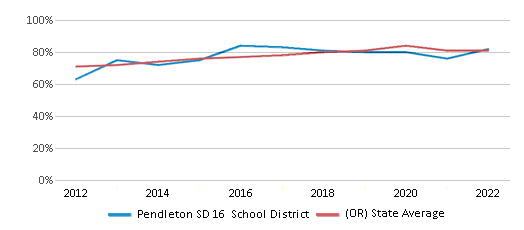
Students by Ethnicity:
Diversity Score
0.57
0.67
# American Indian Students
335 Students
200 Students
% American Indian Students
11%
1%
# Asian Students
19 Students
1,549 Students
% Asian Students
1%
5%
# Hispanic Students
425 Students
8,817 Students
% Hispanic Students
15%
30%
# Black Students
24 Students
1,664 Students
% Black Students
1%
6%
# White Students
1,812 Students
14,394 Students
% White Students
63%
48%
# Hawaiian Students
4 Students
371 Students
% Hawaiian Students
n/a
1%
# Two or more races Students
256 Students
2,665 Students
% of Two or more races Students
9%
9%
Students by Grade:
# Students in PK Grade:
-
-
# Students in K Grade:
228
4,906
# Students in 1st Grade:
214
4,696
# Students in 2nd Grade:
204
4,983
# Students in 3rd Grade:
235
4,490
# Students in 4th Grade:
231
4,747
# Students in 5th Grade:
235
4,341
# Students in 6th Grade:
229
599
# Students in 7th Grade:
192
330
# Students in 8th Grade:
227
296
# Students in 9th Grade:
220
77
# Students in 10th Grade:
221
82
# Students in 11th Grade:
249
91
# Students in 12th Grade:
205
76
# Ungraded Students:
-
-
District Revenue and Spending
The revenue/student of $14,557 in this school district is less than the state median of $18,279. The school district revenue/student has stayed relatively flat over four school years.
The school district's spending/student of $13,951 is less than the state median of $19,325. The school district spending/student has stayed relatively flat over four school years.
Total Revenue
$42 MM
$9,902 MM
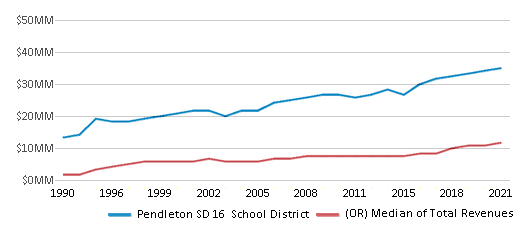
Spending
$40 MM
$10,468 MM
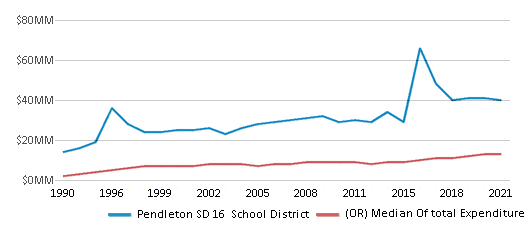
Revenue / Student
$14,557
$18,279
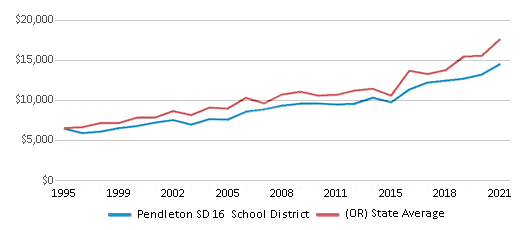
Spending / Student
$13,951
$19,325
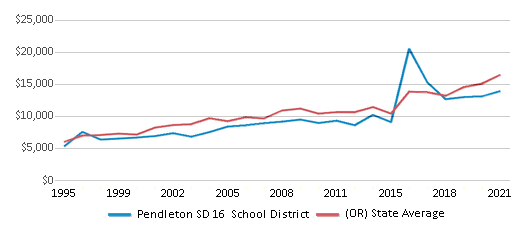
Best Pendleton SD 16 School District Public Preschools (2025)
School
(Math and Reading Proficiency)
(Math and Reading Proficiency)
Location
Grades
Students
Rank: n/an/a
455 Sw 13th St
Pendleton, OR 97801
(541) 966-3300
Pendleton, OR 97801
(541) 966-3300
Grades: PK-K
| 228 students
Recent Articles

What Is A Charter School?
Explore the world of charter schools in this comprehensive guide. Learn about their history, how they operate, and the pros and cons of this educational innovation. Discover key facts about charter schools, including admission policies, demographics, and funding, as well as what to look for when considering a charter school for your child.

10 Reasons Why High School Sports Benefit Students
Discover the 10 compelling reasons why high school sports are beneficial for students. This comprehensive article explores how athletics enhance academic performance, foster personal growth, and develop crucial life skills. From improved fitness and time management to leadership development and community representation, learn why participating in high school sports can be a game-changer for students' overall success and well-being.

February 05, 2025
Understanding the U.S. Department of Education: Structure, Impact, and EvolutionWe explore how the Department of Education shapes American education, from its cabinet-level leadership to its impact on millions of students, written for general audiences seeking clarity on this vital institution.





